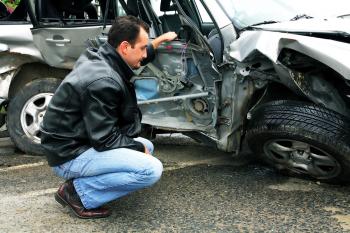What to do in an Auto Accident?

Car accidents, because of numerous distractions and the sheer volume of automobiles on the road, have unfortunately become commonplace. The circumstances and injuries that surround an auto accident will vary based on circumstance; however, understanding what to do in an auto accident will universally expedite the filing of a an insurance claim and organize your ability to seek compensation and closure. Understanding what to do in an auto accident is crucial for not only expediting the claim, but also for easing your emotions. Being conscious of the process (the insurance claim, the police report etc) will help harness adrenaline and other emotions that are typically realized after you have been involved in an accident.
Before filing a claim or worrying about liability issues, the first thing you must do after an auto accident is get your car, if possible, to the side of the road. Once you are in a safe location (for example on the side of the road) you must begin dialogue with the other party involved in the accident.
The Exchange of Information:
before you can exchange information with the other party (if applicable), you must ensure that the driver is conscious and not in need of immediate medical attention. Once contact has been made, you can begin the exchange of information--assuming both parties are able to do so. The exchange of information can take place directly at the scene or afterwards, if the parties involved require immediate medical attention. Regardless of the scenario; however, the information exchanged must: the individual’s address, name, contact information, insurance information, driver’s license number and license plate number. Insurance information is exchanged so the parties can be in communication with the providers--such efforts are only necessary if the accident requires the inclusion of insurance companies. If the accident requires a criminal investigation, due to negligent or violent actions, law enforcement officers will conduct a thorough investigation, which is to be reviewed by the party's respective lawyers. The exchange of information, is necessary for the insurance companies and the police to conduct their reports--these reports are ultimately used to determined liability.
The Exchange of information is the key step following an auto accident; this communication enables a formal investigation to be conducted by law enforcement agents and the underlying insurance companies. The most important thing an individual can do following an auto accident is to be under control and think in a lucid manner. Remember, your insurance provider and the police will take care of the hard work--your responsibility is to comply with regulation and coordinate the exchange of information.
Related Topics
- Quick Overview of Car Accident Pictures
- 4 Common Causes of Car Accident
- The Full Guide to Auto Accidents
- Fatal Auto Accidents
- Learn About Insurance Rates After A Car Accident
- Quick Overview of Accident in Car
- The Truth About Auto Accidents
- Traffic Accident Overview
- Hit And Run
- Facts about Auto Driving Accidents